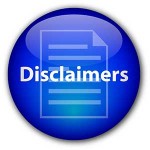 What is a food disclaimer?
What is a food disclaimer?
A food disclaimer is a document companies post on the label of their products, or make available to consumers to disclose certain facts about a food product that must be disclosed by law or, to provide a warning to persons who have food allergies.
What is the purpose of a food disclaimer?
Issuing a food disclaimer is considered a defensive tactic taken by a food producer against potential liabilities that it may have to face in the absence of the disclaimer. Like a warning on a bottle of prescription drugs, a food disclaimer is a legal statement, which, in general, provides consumers with valuable information about the content of a food product. Additionally, a food disclaimer may be required by law or FDA regulation. For example, a law in Louisiana was passed that requires:
All establishments that sell or serve raw oysters must display signs, menu notices, table tents, or other clearly visible messages at the point of sale with either of the following wording:
1. “THERE MAY BE A RISK ASSOCIATED WITH CONSUMING RAW SHELLFISH AS IS THE CASE WITH OTHER RAW PROTEIN PRODUCTS. IF YOU SUFFER FROM CHRONIC ILLNESS OF THE LIVER, STOMACH OR BLOOD OR HAVE OTHER IMMUNE DISORDERS, YOU SHOULD EAT THESE PRODUCTS FULLY COOKED”;
or
2. “CONSUMING RAW OR UNDERCOOKED MEATS, POULTRY, SEAFOOD, SHELLFISH OR EGGS MAY INCREASE YOUR RISK OF FOODBORNE ILLNESS, ESPECIALLY IF YOU HAVE CERTAIN MEDICAL CONDITIONS.”
Thus, a restaurant that serves oysters in Louisiana and fails to comply with its duty to place clear, visible warning signs at the point of sale relating to the dangers of consuming raw or uncooked shellfish or oysters could be liable to a patron who sustained an illness as a result of eating oysters.
NOTE: Disclaimers are important and can provide some level of protection. However, if you have a website, our terms and conditions contain several important disclaimers to help reduce your legal liability. You can see the details at this link:
https://www.disclaimertemplate.com/website-terms-and-conditions-template/
Why should your company have a food disclaimer?
A food disclaimer is advisable for any company that manufactures or sells food products that may adversely affect even a small percentage of the population to protect itself from potential suits from customers who suffer injury. Likewise, a food disclaimer may also be required by law, such as a Food & Drug Administration (“FDA”) regulation. For example, 21 C.F.R. § 101.60(c)(1) bars the use of the terms “sugar-free” or “sugarless” on foods that are not low-calorie, unless they bear an express warning immediately adjacent to each use of the terms that discloses that the food is “not a reduced-calorie food,” or “not a low-calorie food,” or “not for weight control.”
Likewise, the same regulation goes on to provide that the terms “no added sugar,” “without added sugar,” or “no sugar added” may be used if certain requirements have been met, including a disclaimer that the food is not “low calorie” or “calorie reduced," and that directs consumers' attention to the nutrition panel for further information on sugar and calorie content.
Other food disclaimer examples include without limitation:
1. “These items are cooked to order and may be served raw or undercooked. Consuming raw or undercooked meats, poultry, seafood, shellfish, or eggs may increase the risk of foodborne illness.” [on a restaurant menu where the restaurant sells hamburgers]
2. “Our store offers products with peanuts, tree nuts, soy, milk, eggs and wheat. While we take steps to minimize the risk of cross-contamination, we cannot guarantee that any of our products are safe to consumer for people with peanut, tree nut, soy, milk, egg or wheat allergies.” [warning that might appear at a health-food store]
3. “CAUTION: Contains caffeine comparable to a cup of the leading premium coffee. Limit caffeine products to avoid nervousness, sleeplessness, and occasionally rapid heartbeat. You may experience a Niacin Flush (hot feeling, skin redness) that lasts a few minutes. This is caused by increased blood flow near the skin.” [warning used on the 5 Hour Energy shot product]
4. “XYZ University Dining operates the Farmer’s Bakery, which produces baked goods that contain nuts. We cannot guarantee the absence of cross‐contamination in our baked foods.
XYZ University Dining does not assume liability for adverse reactions to foods consumed, or items one may come into contact with while eating at any University establishment.
Students with food allergies are encouraged to contact the Dining Quality Standards Coordinator, Jane Doe, who can be reached at [email protected] for additional information and support.” [warning appropriate for a university dining hall]
5. “Contains tree nuts (hazelnuts). Produced in a facility that uses wheat, soy and milk.” [warning contained on a package of Nature’s Path Organic Maple Nut Oatmeal].
On the other hand, an open and obvious danger may not require a disclaimer. Thus, in one Florida case, it was held that where the dangers of drinking alcohol in excess were obvious and commonly known, a manufacturer did not have a duty to warn about any dangers in consuming an alcoholic energy drink. Cook v. MillerCoors, LLC, 872 F. Supp. 2d 1346 (M.D. Fla. 2012).
Conclusion
A thorough and well-written food disclaimer will serve to help protect a company from FDA enforcement actions, litigation from consumers who suffer allergic reactions to foods sold or served, and in many cases will protect the customers themselves by allowing them to make an informed decision as to whether to purchase or consumer a particular food or food product. If you are going to write your own food disclaimer, you should have an attorney review it before you put it to use. The best method is to simply let your attorney draft one for you.


